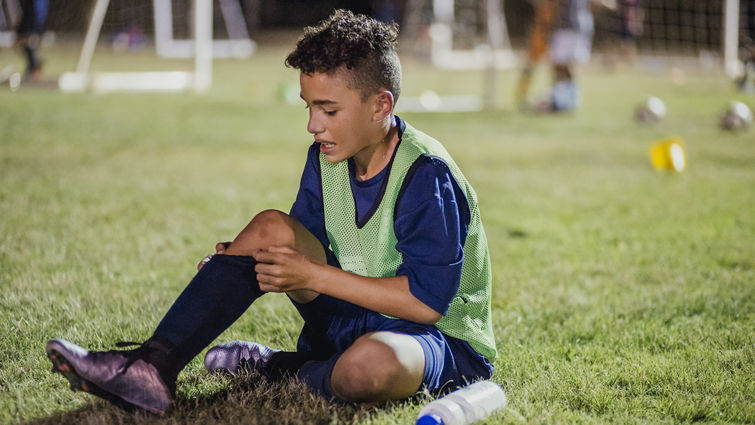
With the many illnesses and injuries that back-to-school season can bring to their kids, parents may have difficulty identifying which symptoms are not serious and which shouldn't be ignored.
Jonathan Smits, MD, a pediatric sports medicine physician for Loma Linda University Children's Health, says as kids return to sports or playground activities, certain injuries may become more commonplace.
"For elementary kids, we start seeing a lot of arm injuries or even head injuries from falls off playground equipment," Smits says. "With older kids, it's usually injuries involving the legs, ankles, and lower extremities, especially if they play sports."
He outlines some red flags parents should be aware of after their child or teen is injured, saying these issues could warrant a call to their pediatrician, a visit to urgent care, or even a visit to the emergency department.
1. Dislocation
"Certainly, if any of the larger extremities is out of position — for example, a shoulder or a knee cap — this would warrant taking a trip to the hospital," Smits says. "If it's not going back into joint easily on its own, please don't try to pop it back in yourself."
For more minor dislocations like a finger that pops back into the socket during the injury, Smits says parents should monitor if the finger stays in place, its mobility, and the child's pain level. "I would recommend they get it checked at their pediatrician's office within a few days of the injury if it's still bothering the child, but make sure it's remaining stationary and is not being pulled on," he says.
2. Lack of mobility
"If you notice your child is unwilling to use their affected extremity, like an arm, wrist, leg, etc., after an injury, or it hurts them to bend it, then that's the time you should take them to get X-rays done," Smits says.
For example, if your child has a sprain and within a few days still can't put weight on the area or it's stiff, Smits recommends getting it checked to evaluate whether it is a sprain that needs more rest or a minor fracture.
3. Complications after head injury
"Anytime a child passes out, especially if it's for more than just a few seconds after a head injury, or if they're confused and disoriented, vomiting, or experiencing headaches, those are big red flag symptoms," Smits says.
However, he explains that contrary to popular belief, it's okay to let people rest after they receive a head injury. "There's a myth that if someone concusses themselves, you don't want to let them sleep but rather wake them up, but in reality, that's not the right approach," he says. "Generally, someone with a big bleed or fracture will be in a lot of pain and won't be trying to sleep. In that case, you want to be around if they need help. But for any concussions that are simple head injuries, resting and allowing the brain to rest and get good sleep is a helpful treatment."
As a parent, Smits encourages checking on the child periodically to ensure they're comfortable and resting well, but not waking them up to check on them throughout the night.
4. Abdominal pain
"Belly injuries and trauma can occur in contact sports, so if your child has pain in the abdomen and they're not willing to move around comfortably and easily, they should see a doctor," Smits says. "Especially visit your doctor if your child has blood in their urine or stool as these could all point to internal injuries, which can be quite serious."
5. Genital pain
"Boys especially may have testicular injuries due to sports or testicular torsion," Smits says. "If they complain of genital pain after an injury, they should go to the Emergency Department as soon as possible. Some people wait because they don't think it's serious, or their child may hide how much pain they're in, but it's important to see a doctor right away."
While not every injury needs a doctor's visit, Smits encourages parents to always reach out to their pediatricians if they have any questions or concerns — together, you can determine the best course of action for your child.
Visit us online to make an appointment or call 855-977-4573.
